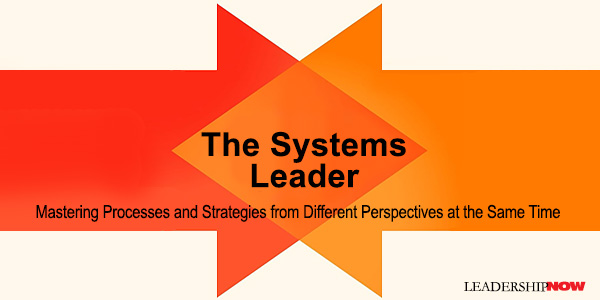 |
 |
08.19.25

The Systems Leader
WE experience a tsunami of chaos in our environment, creating cross-pressures to achieve what appear to be contradictory goals at the same time. The solution is what Robert E. Siegel calls Systems Leadership. “Leaders face pressure to do opposing things at the same time, which can make them feel like no matter what they do or how well they do it, they are getting it all wrong.” The Systems Leader by Robert Siegel is based on systems thinking as made accessible in Peter Senge’s classic book The Fifth Discipline. In it, he “emphasized the interplay of actions and reactions between components of any kind of system, and the importance of studying those relationships holistically, not as isolated parts.” Systems Leadership incorporates strategies to reframe and learn how to master five key dimensions of cross-pressures that most leaders find themselves embroiled in and many fail to confront: Priorities: The need to succeed at both execution and innovation
Systems Leadership begins with embracing how much you don’t know at any given moment, and gives you a way to move forward with reasonable confidence but not delusional overconfidence. Siegel asserts that many leaders fail to deal with these cross-pressures because they engage in counterproductive behaviors that feel good in the moment. For example, replacing decorum with outrageousness, focusing on trivial goals, ignoring changes you don’t like, and indulging in self-righteousness. Regarding ignoring changes you don’t like, he says some leaders act like nothing has changed, “hoping that the traditional ways of the universe will somehow reassert themselves.” He adds, “Fully understanding the reasons for past successes can help you internalize whether your old ‘playbook’ is still useful for a current or future challenge.” Systems leadership is the “ability to master processes and strategies from different perspectives at the same time.” And to do it consistently in good times and bad. Here is a checklist of principles to guide your systems leadership: A Systems Leader’s Checklist Leader, know thyself. To be able to act intentionally rather than impulsively. “Leadership is the ability to constrain a response to a given stimulus.” Do the hard jobs yourself. You are not so important that you can’t get your hands dirty and model hard work. It’s moral authority. Be brave enough to say, I don’t know. No one has all the answers, nor are you in control of all that is happening. It’s okay. Listen to internal teammates you can trust. You can avoid many mistakes by listening to internal experts. Find trusted partners outside the company. You need trustworthy voices from outside the organization who can tell you what you need to hear and not what you want to hear. Hold two truths at once. “No matter how good things are now, prepare for a challenging future. And no matter how bad things are now, take heart that bad times don’t last forever.” Watch where you spend your time, because the people who report to you are watching. Make time for what matters most. Be mindful of the difference between skill and luck. There are times when your luck mattered more than your skills. “If nothing else, it will bring an awareness that the things you did during your lucky moments are not necessarily the playbook you should copy in the future.” Ask yourself if you’d rehire yourself today for your current job. Are you the best person for your role now? Changing times require new skills. 
Posted by Michael McKinney at 05:43 PM
|
BUILD YOUR KNOWLEDGE
 

How to Do Your Start-Up Right STRAIGHT TALK FOR START-UPS 
Grow Your Leadership Skills NEW AND UPCOMING LEADERSHIP BOOKS 
Leadership Minute BITE-SIZE CONCEPTS YOU CAN CHEW ON 
Classic Leadership Books BOOKS TO READ BEFORE YOU LEAD |